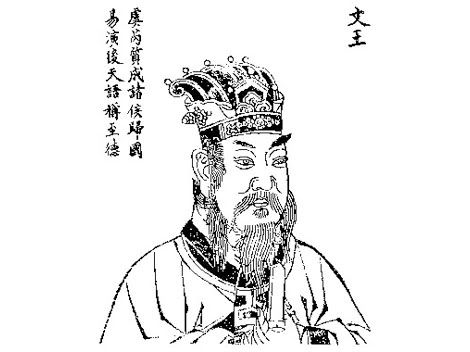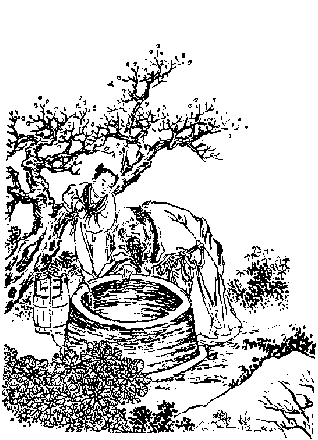Tag: I-Ching
Jul 13 2010
The Well
May 29 2010
Saturday I-Ching
Meet King Wen of Zhou:

King Wen had a profound role in illuminating the I-Ching. He began the Zhou Dynasty, which lasted for 800 years and 37 emperors.
But King Wen himself did not live to enjoy this victory over the evil King Zhou, Emperor of the Shang dynasty, who had imprisoned King Wen, fearing his influence (as he well should have!).
Today’s I-Ching reading made me think of King Wen.
The I-Ching provided Hexagram 34, “The Power of the Great” with two changing lines, transforming to Hexagram 30: The Clinging, Fire:
May 22 2010
Saturday I-Ching

Due to popular demand (ok, one person mentioned it), I once again inquired of the I-Ching to give a message to Docudharmaniacs near and far.
And lo! Three changes were received in Hexagram 48, The Well. Those changes transformed the hexagram to number 33, Retreat.
Contemplating The Well in and of itself helps to shed the conditioning of our age of Mad Modernity and brings us back to the root of our existence.
So much has changed since the dawn of history, but the shape of the well has not changed.
So much has been put forth as philosophy, a veritable mountain of ways of looking at our existence, but the roots of what we need as human beings has not changed at all.
And whether we are good or wicked, intelligent or unintelligent, nice or mean, existence is the same for everyone, it holds no favorites and all can partake of the water of the well with the same right as anyone else.
See below for my completely subjective interpretation of the changes received today.
May 15 2010
Saturday I-Ching

Credit here
I have been wrong in my tags for a long time now! I had misremembered Rimbaud’s manifesto as calling for the derangement of the senses. Actually, the manifesto called for the dissolution of the senses.
My apologies.
I inquired of the I-Ching as to what to tell Docudharmaniacs near and far and got Hexagram 59: Dissolution.
Ha!
There was a changing line in the hexagram which turned it into another hexagram, number 20, “Contemplation.”
Thus the title of this essay.
Jun 08 2008
What the I-Ching Said
I asked the I-Ching if it had anything to say to Docudharma.
And I got a response.
The I-Ching is also called the Book of Changes, and the response I received had two changing lines.
I received Hexagram 61. Chung Fu/Inner Truth.
Here’s some of what the book says about Inner Truth (all quotes are from the Wilhelm/Baynes edition):
The wind blows over the lake and stirs the surface of the water. Thus visible effects of the invisible manifest themselves. The hexagram consists of firm lines aqbove and below, while it is open in the center. This indicates a heart free of prejudices and therefore open to truth. On the other hand, each of the two trigrams has a firm line in the middle; this indicates the force of inner truth in the influences they represent.
…
Joyousness and gentleness are the attributes of the two primary trigrams. Tui means joyousness in following the good, and Sun means penetration into the hearts of men. Thus one establishes the foundation of trust that is necessary in transforming a country.
What are hexagrams? In my cases, I toss 3 Chinese coins 6 times and then draw six lines, one on top of the other. Each toss has a numerical value depending on how they land, sort of a heads/tails kind of thing. If you get an odd number you draw a straight (yang) line. An even number, you draw a broken (yin) line. In certain cases, the numerical value produces what is called a “changing” line. When that happens, the line turns into its opposite and a new hexagram comes forth.
There were two “changing” lines in the hexagram about Docudharma, which means there were specific special messages in this reading.
